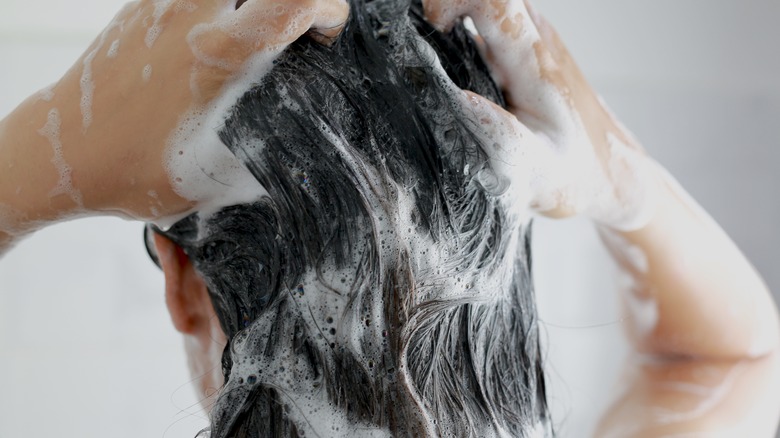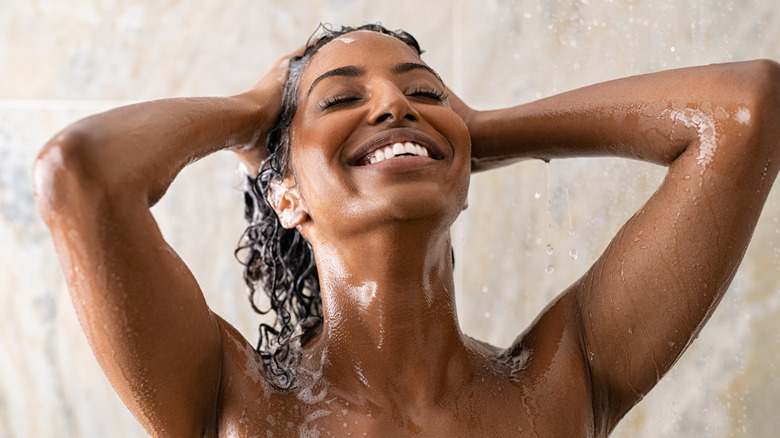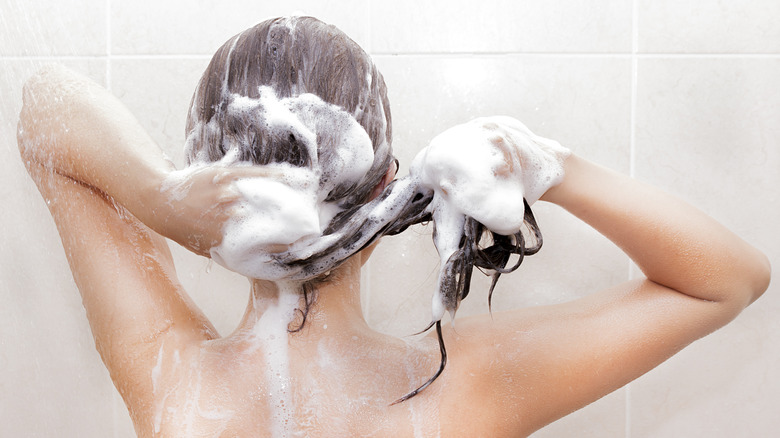Hair Cycling Might Improve The Health Of Your Strands, But Some Argue It's Just Another Cash Grab
Buckle up, friends, because TikTok has introduced us to yet another beauty trend: hair cycling. The trend has its foundation in skin cycling, which essentially means that you use different products based on different needs. Medical aesthetician Amy Peterson told The List: skin cycling "consists of a skincare routine that incorporates products with strong active ingredients on certain days and other days that involve skin repair and rest." Basically, we don't use the exact same products every single day.
It's precisely this definition that helps us launch into the concept of hair cycling. While the trend might come with a spiffy new name, it's really a straightforward regime. "Hair cycling is essentially alternating products in your hair-care routine in order to achieve the healthiest, most optimal results for your hair," celebrity colorist Rita Hazan told PopSugar. The routine generally incorporates different kinds of shampoos, conditioners, and other hair care products so that our hair and scalps don't get overworked by one, targeted product. For example, a detoxifying shampoo can work wonders, but we wouldn't use it every time we wash our hair. While there are some benefits to hair cycling, it has a few downsides. We're worried that it could be nothing more than a cash grab, due to the wide rotation of products needed.
Why does hair cycling require so many products?
While hair cycling holds some appeal, it seems a tad demanding. Celebrity stylist Harry Josh told Women's Health what's required by hair cycling. "It's more than just having a favorite brand or go-to shampoo, it's about having a weekly or monthly cycle of products that have different purposes but are all working together for the common goal of healthy, nourished hair," Josh explained.
To make hair cycling successful, some people use the seasons as a guide. Dermatologist Brooke Jackson told Self that anti-frizz products — from shampoos, conditioners, and treatments — work well in the summer. In the winter, switch to richer products since hair tends to dry out in cold weather. If a seasonal regime doesn't appeal, stylist Amy Abramite told W Magazine that if one wanted to try it, they could first purchase a clarifying shampoo, then a repair-and-strengthening shampoo, followed by a line up of products that help with styling. Mercy!
While this surely works, our concern is that hair cycling is just another beauty trend that pushes us to buy more and more products. While we've got no issue with catering hair care to our specific needs, hair cycling sounds like a very complex regime that involves several different types of shampoos, conditioners, and additional treatments. That's got to come with a hefty price tag. Is it worth it?
What are the real secrets to healthy hair?
Like all trends on TikTok, it's worth investigating deeper before we commit to a shower full of seasonally inspired shampoo and conditioner sets. Sorry TikTok, but we checked with the American Academy of Dermatology to see what they had to say about healthy hair. Their tips included concentrating shampoo on the scalp, since that's where oil builds up, and always using a conditioner after we wash our hair. There was nothing listed about a rotation of different products.
In fact, it seems that the important thing in terms of hair and scalp health was not so much the products we use but the frequency that we wash our hair. Trichologist Guy Parsons told Good To Know what we need for a litmus test when it comes to hair washing. "You should wash your hair whenever your scalp feels greasy, dirty or smelly, regardless of your hair type," Parsons said. In fact, one of the few products that Parsons recommended was dry shampoo to extend the life of a hair cycle, and avoid heated tools, which really causes damage to our hair. If the trend of hair cycling is appealing, go for it! But just because it's a new trend doesn't mean that it's what's best for our hair or worth the expense that a whole regime of products would cost.


